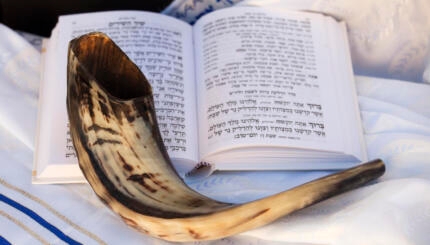At the conclusion of services, the rabbi was standing at the door shaking hands as the congregation departed. As he saw Joseph coming out of the synagogue, the rabbi grabbed Joseph by the hand and pulled him aside. Impassioned by the holiness of the day, the rabbi said to him, “You need to join the Army of God!”
Joseph replied, “I’m already in the Army of God, Rabbi.”
The rabbi questioned, “Then how come I don’t see you except for
and Yom Kippur?”
Joseph whispered back, “I’m in the secret service.”
I’ve often wondered what it is that brings people to enlist in the secret service exclusively for the Yamim Nora’im, the Days of Awe. For many, I believe it is a sense of nostalgia for tradition. For others, it is a source of community. Some come for the beauty of the Hazzanut, of the Cantor beautifully chanting sacred melodies. Some even come because they enjoy praying.
But I think for many, the reason we come to synagogue on the High Holidays is the safety of the boredom we encounter. We know that if we sit (and often stand) for hours on end, in uncomfortable dress clothes and in poorly air conditioned buildings, we have “done” our Jewish thing, done our introspection for the year. We can check off the box. It is the holiday equivalent of taking our medicine: if we successfully endure the High Holiday services, we have done what is expected of us (by society? by deceased parents whose guilt-trips about Jewish identity still weigh upon us? by a God of Judgment lurking somewhere in the dark recesses of our minds?). And we can move on with our “real” lives about as quickly as we digest the lox and bagel at our break the fast meal.
The truth is, though, that our boredom serves as a protective barrier during the High Holidays. The purpose of the Days of Awe, from the liturgy to the haunting melodies, from the shofar to the sacred task of teshuvah (repentance/turning from our prior ways), is to shatter our delusions of safety and comfort with existential questions, alerting us to the precariousness of our mortality and challenging us about the quality of the life we have been living. The reason for coming to is not to endure boredom but to confront the messiness of life. So as we embark on the year 5774 on Wednesday evening, I hope that we will have the courage to reject boredom during the Days of Awe. I pray that rabbis and laity alike will use the sacred tools of the Yamim Noraim to challenge ourselves to lead more mindful, more meaningful, and more holy lives in the coming year.
Shanah Tovah.



